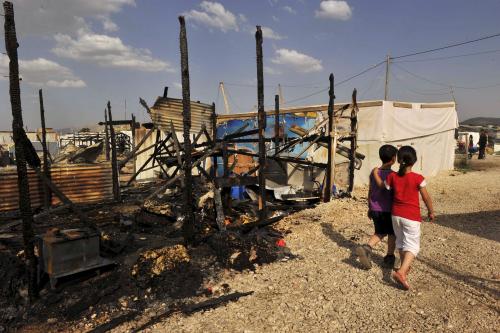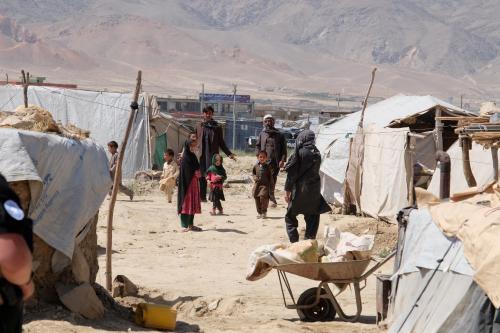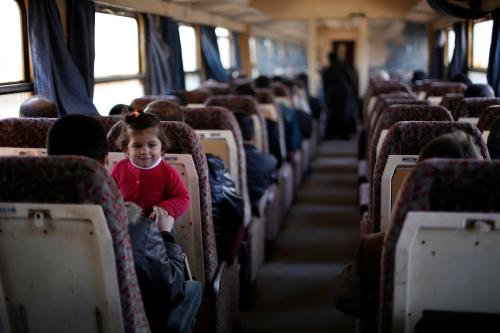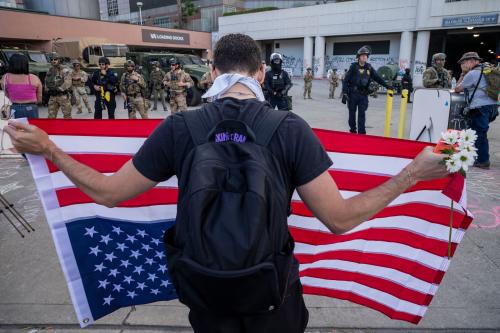Forced displacement of populations has been an integral part of the Syrian war, as evidenced by last week’s use of chemical weapons in the fall of Eastern Ghouta and the evacuation of much of the enclave’s Sunni population to rebel-held areas in the north. Indeed, over half of Syria’s pre-war population has been forcibly displaced since 2011.
Refugees number 1.1 million in Lebanon, 660,000 in Jordan, 3.4 million in Turkey, and around a million in Europe. Over 6 million Syrians are classified as internally displaced peoples (IDPs). About 80 percent of the refugees are Arab Sunnis, also accounting for the bulk of the IDPs. Once a majority at 65 percent of the populations, Sunnis are now a plurality within the country, accounting for perhaps 30-40 percent of the population. Before the war, the other sects stood at 15 percent Kurdish, 10 percent Alawite, 5 percent Christian, 3 percent Druze, 1 percent Ismaili, and 1 percent Twelver Shia. Against a largely Sunni opposition has been the Alawite dominated state with most minorities standing with it as well as significant parts of the Sunni middle classes.
With this complex ethnic and sectarian mix, one of the defining characteristics of the war has been charges of ethnic cleansing against almost all sides. Sunnis have been forcibly displaced by the Syrian military or its allies—some reportedly replaced with friendlier populations. Islamic State and other groups have forcibly removed and/or massacred Shiites, Yazidis, Alawites, Christians, Kurds, etc. Various Arabization efforts, especially in Iraq but also in Syria, had previously targeted Kurds. More recently, Kurds have been accused of taking over non-Kurdish areas and removing or barring the return of non-Kurdish residents, again mostly Sunni Arabs. Similarly, Turkey is accused by the Kurdish-led SDF of ethnic cleansing in Afrin.
Once the shooting stops, millions in and outside Syria will seek justice and retribution alongside restitution and compensation. How this is tackled will largely determine whether, after the immediate relief and exhaustion of the war’s ending, a peaceful, multi-sectarian society is restored; or Syrians simply mark time till the next conflagration, and repression continues unabated.
Sustained peace and reconciliation will require international agreements and legislation. Perhaps surprisingly, ethnic cleansing is not recognized as an independent crime under international law and has no official definition. The term surfaced during the Yugoslavian conflict of the 1990s. The United Nations Commission on Human Rights states that ethnic displacement “entails deportations and forcible mass removal or expulsion of persons from their homes…aimed at the dislocation or destruction of national, ethnic, racial, or religious groups.” Andrew Bell-Fialkoff, co-author of “Ethnic Cleansing,” says, “…ethnic cleansing can be understood as the expulsion of an ‘undesirable’ population from a given territory due to religious or ethnic discrimination, political, strategic, or ideological considerations, or a combination.”
A United Nations Commission of Experts on Yugoslavia’s wars, echoing today’s headlines from Syria, listed practices used to remove civilians: “murder, torture, arbitrary arrest and detention, extrajudicial executions, rape and sexual assaults confinement of civilians in ghettos…forcible displacement and deportation of civilians, military attacks, or threats of attacks on civilians…civilians as human shields, destruction and robbery of personal property, attacks on hospitals, medical personnel.”
One only needs to remember Syria’s sieges, among them Eastern Ghouta, and the repeated use of chemical weapons, perpetrated by the government as well as some rebel groups, to see that these horrors have become a fixture in the media and tragically in the lives of millions of Syrians.
Since ethnic cleansing is not a crime under international law, violations must contravene the Rome Statute of the International Criminal Court (ICC). Article 6 codifies genocide, and Article 7 codifies crimes against humanity. Genocide means “killing or deliberately inflicting conditions calculated to bring about physical destruction of a group with the intent to destroy, in whole or in part, a national, ethnic, racial, or religious group.” Crimes against humanity constitute murder, extermination, deportation or forcible transfer of a population, and rape that are committed “as part of a widespread or systemic attack directed against any civilian population.”
Genocide can be more difficult to prosecute since intent can be difficult to prove; crimes against humanity are clearer. However, countries must sign on to the ICC for it to have jurisdiction. Syria and Iran have not ratified—ditto for Russia and the United States. Iraq, Lebanon, and Turkey have not signed on. The U.N. Security Council can issue an “ICC referral,” giving the court jurisdiction, but as has happened before, Russian vetoes will likely protect the Syrian government.
Yet, the victims themselves are there to bear witness for generations to come. The crimes are well documented by groups ranging from U.N. agencies to the Syrian Observatory for Human Rights to Amnesty International, Human Rights Watch, and others such as the Commission for International Justice and Accountability.
To prevent future carnage, a national reconciliation process is needed. The ICC has limited capacity and will only be able to try a few senior people most responsible for widespread crimes. Though a crucial step, Syrian courts or a broader international effort would be needed for lower-ranked individuals and crimes as well as non-judicial measures like reparations. The gist of a reconciliation process was well stated by the Council of Europe as it looked at durable peace in the former Yugoslavia: “post-war justice is not only judicial and retributive…It is above all restorative and preventive, providing redress to victims and to eliminate impunity and ensure that all people in the region come to terms with the past, and live in peace and security.”
That reconciliation seems a rather remote prospect given today’s reality in Syria only underlines the country’s ultimate fragility.
The Brookings Institution is committed to quality, independence, and impact.
We are supported by a diverse array of funders. In line with our values and policies, each Brookings publication represents the sole views of its author(s).








Commentary
Preventing endless wars in Syria
April 18, 2018